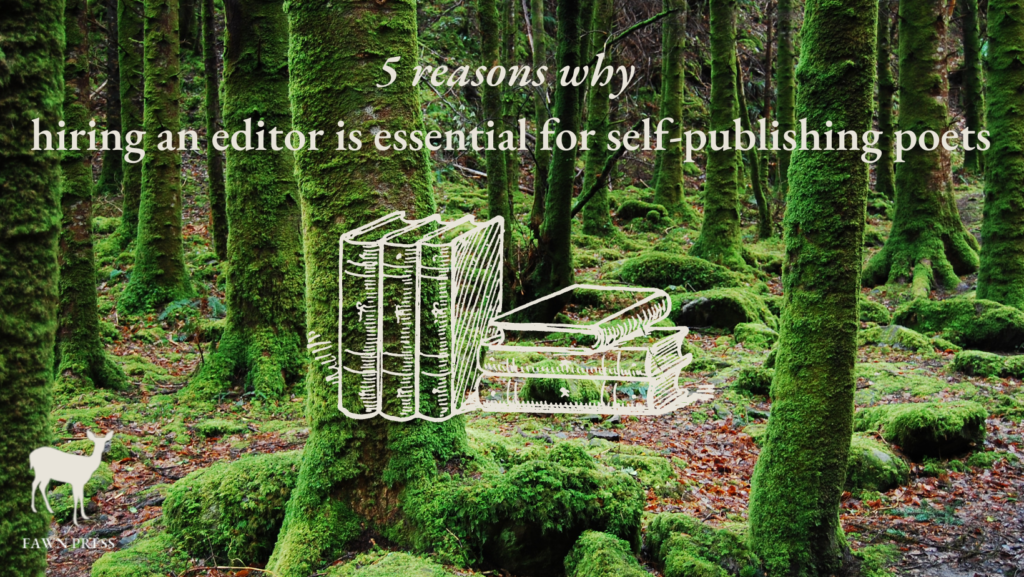Poets create mesmerising worlds, embed meaningful themes and exude powerful messages through their work. The impact of a particular line can be embossed into the readers psyche, treasured forever as a personal mantra. This magik tool used throughout the ages, capable of opening up new realms of perception, new ways of seeing the world and the self, deserves to be represented to a high standard. The diagnostic nit picking of a sturdy edit is necessary to present the intention without the interruption of a spelling error to distract the reader.
The fact is, no matter how beautiful or grand the content is, an unedited poetry book will be perceived as unprofessional by the wider audience and reviewers. Having a pristinely proofread collection is vital for being taken seriously as a published poet. So here are some reasons why having a professional editor collaborate with you can help elevate your work to a polished standard!
1.The brain has a natural inclination to manufacture information
Many editors themselves when publishing their own work, will hire another editor. This is because it is incredibly hard to self-edit! Often, the brain will fill in blanks or details that aren’t there, sometimes falling into the trap of reading what you thought you wrote, rather than what exists on the page.
“When you’re writing, you’re trying to convey meaning. It’s a very high-level task” says Tom Stafford of Uni of Sheffield, who studies the psychology behind making spelling errors. “We don’t catch every detail (…) rather, we take in sensory information and combine it with what we expect, and we extract meaning.“
Even with a strong skill in English, errors are human and normal brain processes. It doesn’t indicate a lack of intelligence, or that someone is bad at English at all, it’s just how brains are wired to work.
2.You need fresh eyes
Leading nicely into our next point, taking a step back from any art is often an insightful act. Being too isolated with our material can allow for mistakes to go undetected. Allowing a pair of fresh eyes can be the ticket to a well finished product. It’s proven that it is easier to check for mistakes when it isn’t your own writing!
This quote from Nick Stockton of Wired Magazine puts it best saying,
“When we’re reading other peoples’ work, this helps us arrive at meaning faster by using less brain power. When we’re proofreading our own work, we know the meaning we want to convey. Because we expect that meaning to be there, it’s easier for us to miss when parts (or all) of it are absent. The reason we don’t see our own typos is because what we see on the screen is competing with the version that exists in our heads.”
3.Writing and editing are different skills
The creative side to poetry can feel very different to the preparation and fine tuning of grammatical details, spelling and punctuation essential to publishing work. Being able to write and being able to edit are very different skills- even using different parts of the brain according to psychology! The left side being analytical and methodical, and the right being more artistic and creative. (Corballis, 2014; Joseph, 1988). More often than not, people tend to lean more one way than the other. Being blessed and/or practiced in the art of poetry does not guarantee a professional level of diagnostic, rational and thorough mistake spotting.
4.It can interrupt the creative flow
When tasked with the feat of articulating metaphysical meaning into the confines of language, lexicon and grammar, there is a lot of brain power being used! “When writing a particular word, we already have the next few words stored in our minds, ready for production” (Smith, 2005). This is an anticipatory process, where our minds are going faster than our hands! People work differently, but personally, I write best when feeling in the flow of things. I find editing as I write disrupts the stream of consciousness that is being expressed on to the page. Switching to a methodical mindset in the middle of a creative burst for me can feel sometimes jarring, like I’m being pulled back to earth when I’m up in the clouds receiving messages from my own higher consciousness. Or sometimes it just makes me lose touch with the idea I’m trying to convey, often forgetting the way I wanted to originally phrase something. Each to their own, some writers do prefer to edit as they go, but it is something to ponder on. Its nice to have the choice and not be forced to do because you haven’t got an editor.
5.An editor does WAY more than spell check
Finally, editors will help you out with a whole host of things. Here’s a condensed list!
-Grammar, punctuation.,,// and spellliing
– Spotting g a p s
> Identifying inconsistencies
– Spotting a need for expansion of a point
-Looking for repetition and repetitive language
-Looking for repetition and repetitive language (absolute dad jokes there sorry I’ll stop)
-Checking for readability
-Enriching a sense of coherence
-Checking for flow and ease
– Encouraging a linking together of themes
– Excavating a clear message
– Helping to distil clarity of ideas
To enquire about our copywriting and editing services, get in touch with us by contacting info@fawnpress.co.uk
REFERENCES
Corballis, M. C. (2014). Left brain, right brain: facts and fantasies. PLoS Biol, 12(1), e1001767
Joseph, R. (1988). The right cerebral hemisphere: Emotion, music, visual‐spatial skills, body‐image, dreams, and awareness. Journal of Clinical Psychology, 44(5), 630-673
Smyth, Ronald H (2005) Review of Psycholinguistics: A Resource Book for Students. The Canadian Modern Language Review / La revue canadienne des langues vivantes, vol. 61 no. 3, p. 449-451
Nick Stockton (2014) https://www.wired.com/2014/08/wuwt-typos/

